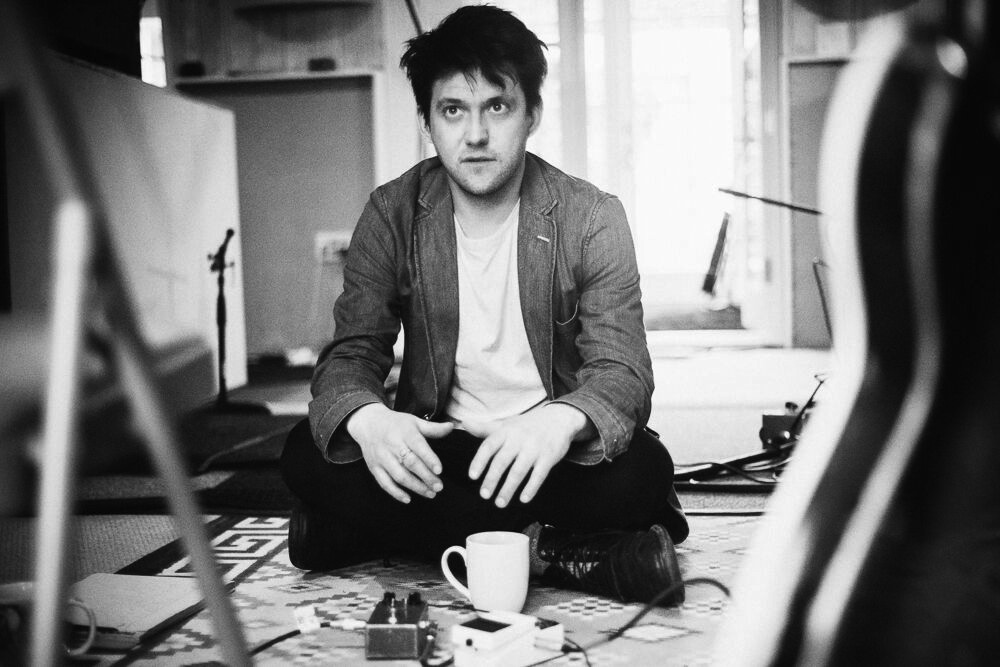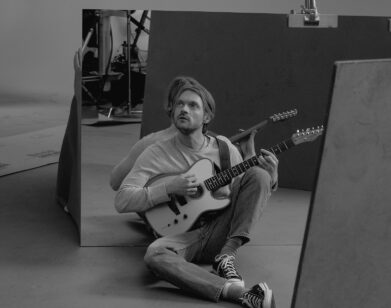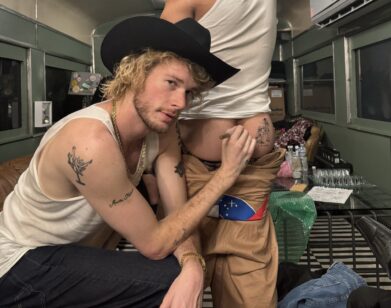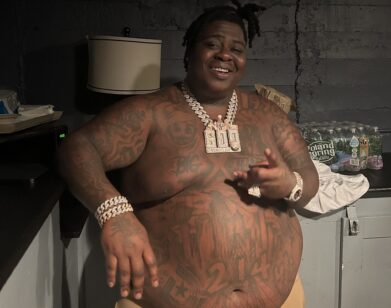Conor Oberst’s Iron Will

Conor Oberst has tried on on many different hats, but remained unequivocally himself. He may have been an angry young man in his first band, Commander Venus, a punk intellectual in Desaparecidos, a troubled philosopher in Bright Eyes, but he has always been incisive, mystical, and vulnerable.
Now that Oberst has been making music for nearly 25 years—since age 13—you’d think he’d have shaken off the teen adulation that first boosted his career. (It’s difficult to find an early profile of Oberst that doesn’t ponder the singer-songwriter’s hair, a feature of much interest to part of his fanbase but seemingly of little to himself.) However, because Oberst’s music has aged so well, he continually gains new fans of different ages who attach themselves to different periods of his discography. And the adolescent appetite for Oberst’s early, feverish albums isn’t going anywhere.
Most recently, Oberst has been releasing music solo under his own name, save for a lone Desaparecido album in 2015 and a Bright Eyes compilation album in 2016. His latest, a 17-track LP, Salutations (out today via Nonesuch), seems to signal a new beginning of sorts. The songs, many of which were released on his acoustic album Ruminations last year, were written during one of the darkest periods of Oberst’s life: amidst empty, but headline-making accusations by a female fan and a major health scare that pulled him off tour. While Ruminations was startling in its vulnerability, its songs take on a steelier quality with a band behind them in Salutations.
Oberst, who is currently touring the U.S., recently spoke to Interview by phone about his dream cult religion, the worst place to perform, and his strange assortment of fans.
ELOISE BLONDIAU: What sort of mythologies and stories are you drawn to?
CONOR OBERST: Initially? I went to Catholic school growing up, so there was the Bible and stuff. There are a lot of stories that stick in your craw when you’re a little kid and you hear them—just weird. I’m not at all a believer in that stuff these days. I guess that would probably be the initial thing. It started when I was so young that you can’t really escape those stories.
BLONDIAU: Do you notice that Catholic schooling creeping into your work in other ways?
OBERST: Oh, for sure. For being a full-grown adult that truly doesn’t care about any of that stuff anymore it’s just subconscious. It never really leaves you, and I’m not saying it’s some kind of trauma or something, it’s fine. My upbringing wasn’t evangelical or super strict or anything. My parents are very cool and liberal. I think when you have that from such a young age, you don’t ever really shake it. I feel like references come out in my songs, and I’m like, “Why am I even thinking about this?” It’s just that it’s so deep in there that it comes out.
BLONDIAU: It does strike me that you’re attracted to the spiritual, though.
OBERST: I think that’s fair to say. I don’t know… Some days I feel like I’m an atheist. Most days, I feel like an agnostic. On a very rare day, I feel like I’m a believer in something. I think that obviously the quest for purpose, or meaning, or understanding to existence is something that I always think about, always deal with. I guess everybody does—that existential crisis of human condition. It’s nothing new. But I’d love to come across something that really made me believe in something. I’m ripe for the picking for the Scientologists—one of those creeps. Someone’s got to find me. Some little weird cult can just pluck me up, because I’m ripe for the picking.
BLONDIAU: Organized religion didn’t do it?
OBERST: No, no. The big religions are all—they’ve all been proven bullshit. I won’t fall for any of that, but some weird obscure little guy might get me.
BLONDIAU: So it sounds like a lot of these influences are subconscious as opposed to chosen.
OBERST: I’ve never conceptualized much of what I write about. Maybe, once I’m onto something, I’ll conceptualize a finished record. I want the songs to tie together and make sense together. I’m not like, “Oh, I want to explore this idea.” That’s just not how the creative process works for me. It’s more like something strikes me, or finds me, and then I wrestle with it after that. I don’t sit back in my armchair, like, “What kind of philosophy can I explore today?”
BLONDIAU: Some of your songs do have a more conceptually clear basis, though.
OBERST: Well, I guess the most obvious project [is my] band Desaparecidos, which is very much different; it’s like an art project. It’s like political punk, almost to the point of being cartoonish. That’s the point of it. That doesn’t really exist the way I feel like it should exist, and so I wanted to make it exist like that.
I love story songs. It’s just, for me, they’re harder to write, and sometimes they sound too intended or something. There was one song on Salutations called “Empty Hotel by the Sea,” which is definitely a story song, start to finish. It’s the story of basically two brothers; one’s trying to save the other. A guy’s in deep with some kind of mob situation, gets taken out, and that’s the end of the song. It’s a story song, but I don’t write those very often. It’s more stream of consciousness usually.
I think just getting stuff down when it’s happening is the best. Obviously, after the fact, you can tweak it, and make it all fit together. I don’t see any harm in letting whatever comes out come out of you, even if it’s sort of weird, or dark, or painful, or too embarrassing, or whatever. I feel like you might as well get it down for yourself. It can’t do anything but help you get to where you want to be by recognizing the thoughts that you’re having.
BLONDIAU: Different phases of your work seem to be reaching different people, different demographics, and they replenish themselves over time. Have you noticed that?
OBERST: I have noticed that in recent years. I think it’s by virtue of how long I’ve been doing it. This is probably a little presumptuous, because I don’t think my record is as good as their record, [but] I always say Fevers and Mirrors [2000] is like the first Violent Femmes record—not as good, but in the sense of when you’re a freshman in high school, somebody gives you a copy of it. There are all of these angsty teenage people who connect with that version, or that era, of my music.
I obviously have done a bunch of different stuff since then, so we have weird jam band-y fans that love the Mystic Valley Band. There are the NPR 50, 60-year-olds at the show, which is awesome. I love seeing that. Looking out and seeing a 65-year-old couple at your show is amazing.
BLONDIAU: I’ve seen you play in Europe and in the U.S., and I found them to be very different experiences due to the different fans you have in those places.
OBERST: Yeah, there are always going to be different vibes. I feel like I need to become a better performer in the sense that I let [the crowd and the atmosphere] affect me too much. Whatever it is: people are talking too much, if people are too reserved, or too crazy. I feel like it can throw me off. Whereas if you’re a true worker in song, a true showman, you should be able to get out there and do your thing no matter what’s going on. I’m not that, unfortunately. Shit pisses me off.
BLONDIAU: I know you’re spending more time in your hometown Omaha these days. Do you like to play there?
OBERST: No. I hate playing in Omaha. Worst crowds, all your friends and family are there. It’s a fucking disaster. I hate it. My least favorite place to play is Omaha.
BLONDIAU: You grew up playing there. I would have thought you were inoculated to that.
OBERST: No, it’s the worst. They’re over me … they’re not listening. They’re just there because they sort of feel like they have to be there. It’s fun to get drunk and hang out, and whatever—it’s just a different thing. It’s like if I were to play at a backyard barbecue or something. Sounds great in theory, but it turns out your friends don’t really want to listen to you.
BLONDIAU: Do you have a favorite place to perform?
OBERST: Getting to some places that are a little bit off the beaten path is fun, because the people are so much more excited and welcoming. Sometimes the arms crossed, shrug your shoulder vibe of a lot of cities is annoying. The biggest cities I don’t really have issues with; they always are dope. New York’s awesome, L.A. is awesome. SF is super awesome to me, always cool. Chicago is kind of weird sometimes. Seattle is weird. It’s just different, and it also depends, totally, on the show, the circumstances.
I know pretty fast within the show if it’s going to click and it’s going to be fun, and feel like we’re having a connection and we’re here together, and here’s my music. It’s either going to be that, or it’s going be adversarial. You are the enemy, you are the other, and I’m going to fuck with you all night.
SALUTATIONS (NONESUCH) IS OUT TODAY, MARCH 17, 2017. FOR MORE ON CONOR OBERST, VISIT HIS WEBSITE.






